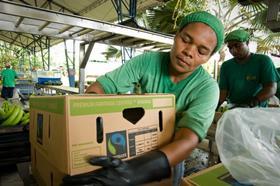
The volume of Fairtrade bananas sold worldwide during 2014 increased by 18 per cent compared with the previous year to 439,474 tonnes, with 43 per cent of that figure produced organically, according to a new report published by Fairtrade International.
During the same period, there was a 13 per cent decrease in the amount of other fresh fruit sold under the Fairtrade certification scheme last year, although the figures involved remained far smaller than for bananas at just 11,660 tonnes. Vegetable volumes, meanwhile, were up 67 per cent to 1,178 tonnes.
In 2014, consumers spent a total of €5.9bn on products carrying the Fairtrade label Mark (a 10 percent increase since 2013), driving increased incomes for certified producers and consequently reducing their vulnerability, the report stated.
As well as for bananas, 2014 saw significant increases in retail sales volumes in key product categories, including cotton (28 per cent) and cocoa (24 per cent).
“Many mature Fairtrade markets experienced steady growth, while Swedish and German shoppers significantly increased their ethical purchases, pushing sales up by 37 and 27 percent respectively,” the report said.
“In the UK, Fairtrade sales were impacted by intensified price competition and deflation in the mainstream grocery sector. Encouragingly there was significant growth in newer and emerging markets: Canada and Hong Kong for example experienced increases of 40 and 42 per cent respectively.”
One and half million farmers and workers round the world are now benefiting from increased sales of Fairtrade products, according to the report.
Latest figures show producers shared an estimated €105m in Fairtrade premiums to invest in business and social projects – 14 per cent more than they did a year before.
According to a recent Fairtrade survey, 93 per cent of its producers are happy with the support services they receive. That figure is supported by independent certification body Flocert, which reported that producers scored Fairtrade an average of 9 out of 10, indicating positive impact for small-scale producers and workers.
“When Fairtrade burst onto farmers’ fields and shop shelves 25 years ago, it was bod,” commented Harriet Lamb, chief executive of Fairtrade International. “Today we still nurture that innovative energy to ensure that Fairtrade is responding to the ever-growing challenges that small-scale farmers and workers face.”






No comments yet